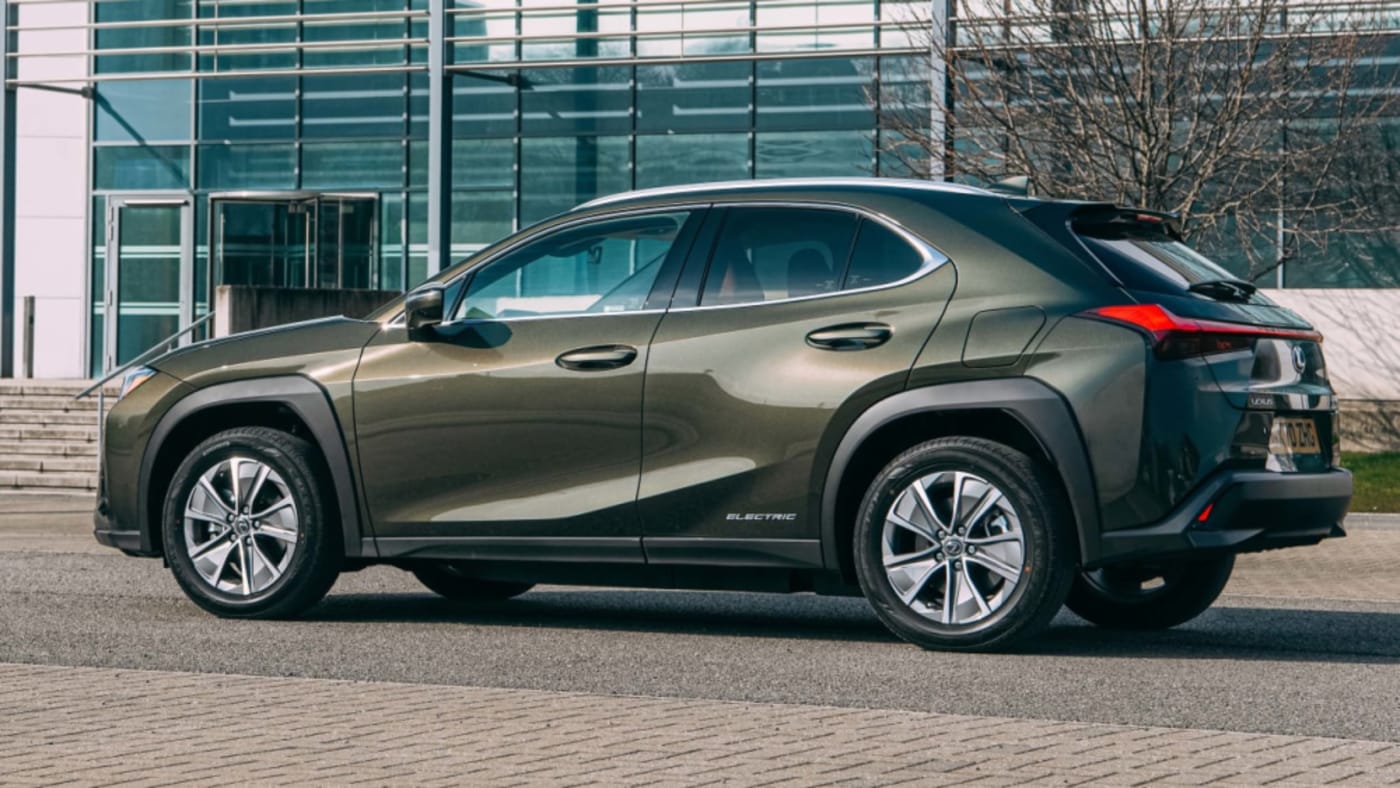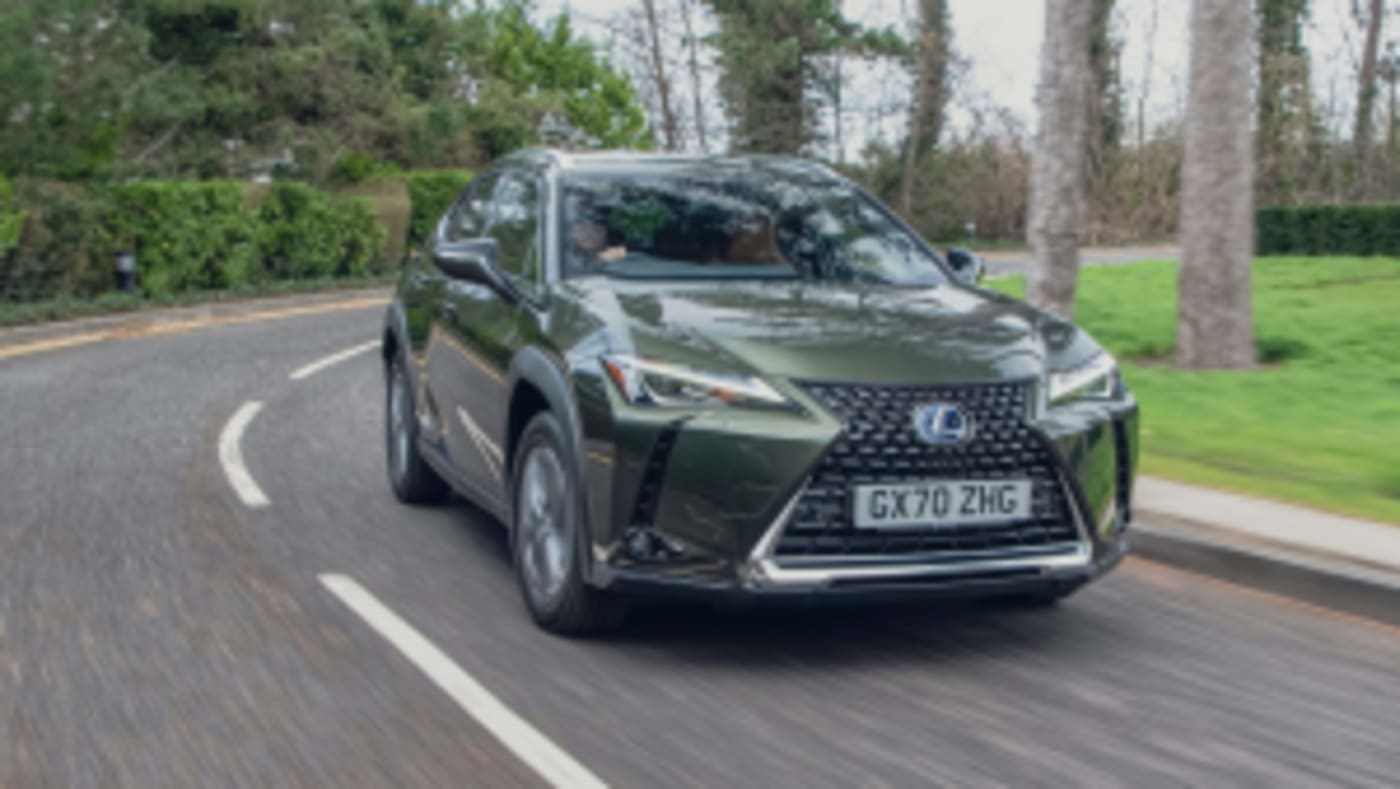Information and electric vehicles of the [object Object] brand

![[object Object] logo](https://res.cloudinary.com/donyiousk/image/upload/w_80/f_auto/c_scale,w_1400/v1/car/d7ioizgecawq1vszmtsz)
Lexus
The future of driving is electric.



Lexus electric vehicles
Lexus is a luxury division of Toyota Motor Corporation and was founded in 1989. Lexus is known for its high-quality vehicles, luxurious interiors, and advanced technology. Lexus has been relatively slow to embrace electric vehicles, but the company is now accelerating its development of EVs.
Currently, Lexus offers only one electric vehicle, the UX 300e. The UX 300e is a subcompact electric SUV that offers a range of up to 196 miles on a single charge. It can accelerate from 0 to 60 mph in 7.5 seconds. The UX 300e comes standard with all-wheel drive and a suite of advanced safety features, including automatic emergency braking, lane departure warning, and adaptive cruise control.
Lexus is also developing a number of other electric vehicles, including the RZ 450e and the LF-Z. The RZ 450e is a midsize electric SUV that is expected to be released in 2023. The LF-Z is a flagship electric sedan that is expected to be released in 2026.
Lexus' EV business is still in its early stages of development. In 2022, Lexus sold only a few hundred electric vehicles. However, Lexus is aiming to increase its EV sales significantly in the coming years. Lexus plans to sell 200,000 electric vehicles per year globally by 2025.
Lexus is facing a number of challenges in the EV market. First, Lexus is a latecomer to the EV market and it is facing competition from established EV makers, such as Tesla, BMW, and Volkswagen. Second, Lexus EVs are expensive. This is because Lexus uses high-quality materials and components in its vehicles. Third, Lexus has a limited range of electric vehicles.
Despite these challenges, Lexus is well-positioned to succeed in the EV market. Lexus has a strong brand reputation and its vehicles are known for their high quality. Lexus is also backed by Toyota Motor Corporation, which has a lot of experience in developing and producing electric vehicles.
Overall, Lexus is a well-positioned company to grow in the EV market. The company has a strong brand reputation, high-quality vehicles, and the backing of Toyota Motor Corporation. However, Lexus will need to address its challenges, such as its late entry to the EV market, expensive EVs, and limited range of EVs, in order to succeed in the long term.
What makes Lexus EVs different from other brands?+
While still relatively new to the EV scene, Lexus brings its renowned focus on luxury and refinement to its electric vehicles, setting them apart from some other brands in notable ways:
Focus on Comfort and Smoothness: Lexus EVs prioritize a quiet, smooth, and luxurious driving experience. They boast well-insulated cabins and advanced suspension systems to minimize noise and road vibrations. This focus on comfort can be a welcome contrast to the sportier performance-oriented approach of some other EV brands.
Premium Materials and Craftsmanship: Lexus is known for its use of high-quality materials and impeccable build quality, and this extends to its EVs. Expect interiors with leather upholstery, soft-touch surfaces, and meticulous attention to detail, further elevating the luxury feel.
Advanced Technology and Features: Lexus packs its EVs with advanced driver-assistance technologies and creature comforts. Features like panoramic sunroofs, head-up displays, premium audio systems, and intuitive infotainment systems are common, enhancing the driving experience and convenience.
Focus on Efficiency and Range: Although Lexus EVs might not be the absolute leaders in range, they offer respectable figures and prioritize efficiency. This translates to longer stretches between charges and potentially lower electricity consumption.
Unique Design Language: Lexus EVs have a distinct design language that sets them apart from the crowd. Think sharp lines, bold grilles, and dramatic curves, resulting in vehicles that are both elegant and eye-catching.
Hybrid Heritage: Lexus leverages its extensive hybrid experience in developing its EVs. This translates to potentially smoother transitions between electric and gas power in hybrid models and potentially more reliable battery management systems.
However, it's important to note that some aspects of Lexus EVs might be seen as downsides compared to other brands:
Limited Model Lineup: Currently, Lexus only offers a handful of EV models, including the UX 300e compact SUV and the RZ 450e crossover. This lack of variety might restrict your choice compared to brands with broader EV offerings.
Later Entry into the EV Market: As a latecomer to the EV scene, Lexus EVs might not yet be as technologically advanced or offer the same range as some established EV brands.
Price Premium: As a luxury brand, Lexus EVs generally come at a higher price point compared to mainstream EV options.
Ultimately, whether Lexus EVs are "better" than other brands depends on your individual priorities. If you value luxury, comfort, refinement, and a unique design, Lexus EVs are definitely worth considering. However, if you prioritize affordability, cutting-edge technology, or a wider range of options, other brands might be a better fit.
What are the different models of Lexus EVs available?+
Currently, Lexus only has one fully electric vehicle model available, the RZ 450e. However, they also offer several hybrids and plug-in hybrids that offer great fuel efficiency and reduced emissions. Here's a breakdown:
Fully Electric SUV:
- RZ 450e: This mid-size SUV boasts a sleek and futuristic design, spacious interior, and impressive technology features like a panoramic sunroof and a digital gauge cluster. It has an EPA-estimated range of 220 miles and can be charged from 10% to 80% in about 30 minutes using a DC fast charger.
Hybrid and Plug-in Hybrid Cars:
- UX 250h and UX 300e: The UX is a compact SUV available in both hybrid and fully electric versions. The hybrid UX 250h offers excellent fuel economy, while the UX 300e has a range of 222 miles on a single charge.
- ES 300h: This mid-size sedan is a luxurious and fuel-efficient option. It has a 2.5-liter 4-cylinder engine paired with an electric motor for a combined output of 215 horsepower and an EPA-estimated combined fuel economy of 44 mpg.
- NX 350h and NX 450h+: The NX is a compact SUV available in both hybrid and plug-in hybrid versions. The hybrid NX 350h offers good fuel economy, while the plug-in hybrid NX 450h+ has an EPA-estimated electric range of 36 miles and a combined fuel economy of 84 MPGe.
- RX 450h+: This mid-size SUV is a spacious and comfortable option with a plug-in hybrid powertrain. It has an EPA-estimated electric range of 36 miles and a combined fuel economy of 84 MPGe.
How much do Lexus EVs cost?+
Currently, Lexus only has one fully electric vehicle, the RZ 450e. It's a luxury SUV with a starting price of $55,150- for the base model. The higher trim levels can go up to nearly $70,000.
Here's a quick breakdown of the RZ 450e's pricing:
- Base model: $55,150
- Premium trim: $58,250
- Luxury trim: $65,250
It's important to note that these are just the starting prices. The actual price of your RZ 450e will depend on options and dealer markup.
Here are some of the RZ 450e's key features:
- All-wheel drive
- 220-mile range
- 0-60 mph in 5.2 seconds
- Spacious and luxurious interior
- Available with advanced driver-assistance features
So, if you're looking for a luxurious and powerful electric SUV, the Lexus RZ 450e is definitely worth considering. Just be prepared to pay a premium price for it.
What is the range of Lexus EVs?+
Lexus currently offers only one fully electric vehicle, the UX 300e, so determining the range is pretty straightforward. However, it's important to remember that the EPA-estimated range can vary depending on several factors, including:
- Driving conditions: Highway driving typically uses more energy than city driving.
- Weather: Cold temperatures can reduce battery range.
- Driving habits: Aggressive acceleration and high speeds reduce range.
With that in mind, here's the range of the Lexus UX 300e:
- EPA-estimated range: 222 miles 357 km
- Real-world range: 165-350 km depending on factors listed above
It's also worth noting that Lexus recently unveiled a concept car called the LF-ZC, which boasts a 1,000 km 620 miles- range thanks to advanced battery technology. However, this car is still in the concept stage and is not expected to hit the market until 2026.
So, the short answer is that the Lexus UX 300e has a range of 222 miles EPA-estimated) or 165-350 km (real-world. However, keep in mind that the actual range may vary depending on various factors. If you're considering purchasing a Lexus UX 300e, be sure to research the real-world range and factor in your typical driving conditions to get a more accurate estimate.
How long does it take to charge a Lexus EV?+
Unfortunately, your question needs a bit more information to give you an accurate answer! The charging time for a Lexus EV depends on several factors, including:
1. Lexus EV Model: Different Lexus EVs have different battery sizes and charging capabilities. For example, the UX 300e with a smaller battery can charge faster than the RZ 450e with a larger battery.
2. Charger Type: There are three main types of chargers:
- Level 1: This is the slowest option, using a standard 120V outlet. Expect around 24 hours for a full charge.
- Level 2: This is a faster option, using a 240V outlet. You can typically get an 80% charge in 30-45 minutes.
- DC Fast Charger: This is the fastest option, often found at public charging stations. You can potentially get a full charge in under 1 hour.
3. Starting Battery Level: Charging speeds are typically faster from a lower battery level. So, a nearly empty battery will charge quicker than one that's already partially charged.
4. Environmental Factors: Extreme temperatures can affect charging speed. Colder weather can slow down charging, while hotter weather can put stress on the battery and potentially limit charging speed.
With all this in mind, here are some general charging times for Lexus EVs:
- UX 300e:
- Level 1: 24 hours
- Level 2: 6-8 hours
- DC Fast Charger: 52 minutes to 80%
- RZ 450e:
- Level 1: 30+ hours
- Level 2: 10-12 hours
- DC Fast Charger: Less than 1 hour to 80%
To get a more accurate answer for your specific Lexus EV, please tell me:
- Which Lexus EV model you are interested in.
- What type of charger you plan to use.
- What the starting battery level is.
What are the maintenance requirements for a Lexus EV?+
Compared to a traditional gasoline-powered car, Lexus EVs require less maintenance overall, but there are still some important things you need to do to keep them running smoothly and safely. Here's a breakdown of the key maintenance needs for a Lexus EV:
Routine Maintenance every 7,500 miles or so:
- Tire Rotation and Balancing: The heavier weight of EV batteries can lead to faster tire wear, so rotations are crucial every 5,000 to 10,000 miles. Balancing ensures smooth operation and longer tire life.
- Multi-point Inspection: This includes checking things like brakes, lights, wiper blades, suspension, and fluid levels. It's crucial for catching any potential issues early on.
- Cabin Air Filter Replacement: Replace the air filter every 2-3 years to keep your cabin air clean and free of allergens.
Less Frequent Maintenance intervals vary:
- Battery Checks: Regular inspections are vital to maintaining the health of your EV's battery, which can last around 100,000 miles or more. Lexus dealerships can perform thorough battery checks.
- Brake Fluid Replacement: Although EVs use regenerative braking, traditional brakes are still there for backup and need maintenance. Expect to replace the brake fluid every 3-5 years.
- Wheel Alignment: Every 15,000 miles, consider getting your wheels aligned to optimize tire wear and maximize your driving range.
Additional Notes:
- Owner's Manual: Always refer to your specific Lexus EV model's owner's manual for the most accurate and up-to-date maintenance schedule.
- Lexus Luxury Care: Consider Lexus Luxury Care, a prepaid maintenance plan that covers factory-recommended services for up to 5 years or 90,000 miles.
- Dealership Service: Lexus dealerships have factory-trained technicians and genuine parts to ensure your EV receives the best possible care.
Does Lexus offer any tax credits or incentives for purchasing an EV?+
Unfortunately, Lexus itself doesn't offer any additional tax credits or incentives beyond the current federal tax credit available for purchasing EVs. However, depending on the specific Lexus EV you're interested in, you might still be eligible for a federal tax credit of up to $7,500. Here's the breakdown:
Federal Tax Credit:
- Applies to new plug-in electric vehicles EVs) and fuel cell electric vehicles (FCEVs purchased in 2023 or later.
- Maximum credit amount: $7,500.
- Eligibility factors:
- Vehicle's MSRP:
- Up to $80,000 for SUVs.
- Up to $55,000 for sedans, wagons, or hatchbacks.
- Battery size: Must have a battery pack capacity of at least 4 kWh.
- Assembly location: Must be manufactured in North America.
Lexus and the Federal Credit:
- Currently, only one Lexus EV, the RZ, qualifies for the full $7,500 federal tax credit.
- Other Lexus EVs, like the UX Hybrid and NX Hybrid, are hybrid models and not eligible for the full credit.
- You can check the IRS website for a complete list of qualified vehicles: Link
Considerations:
- The phase-out for certain manufacturers begins in 2023, impacting the credit amount for some vehicles. Lexus is not currently subject to the phase-out, but it's worth keeping an eye on in the future.
- Your modified adjusted gross income MAGI may also affect your eligibility for the full credit.
Tips:
- Before purchasing a Lexus EV, use the IRS tool to verify its eligibility and potential credit amount: Link
- Consult with a tax professional for personalized advice on claiming the credit.
What is the warranty on a Lexus EV?+
The warranty on a Lexus EV actually consists of two parts: the standard vehicle warranty- and the high-voltage battery warranty. It's important to be aware of both for complete peace of mind.
Standard Vehicle Warranty:
- 5 years/unlimited kilometers: This applies to all new Lexus EVs delivered from January 1, 2021 onwards. If you have an EV purchased before that date, the warranty is 4 years/100,000 km.
- Covers: This warranty covers most components of the vehicle, including the engine, transmission, axles, electrical system, and more, just like a typical car warranty.
- Exclusions: Commercial use vehicles taxis, rental cars, etc. have a limited warranty of 5 years/160,000 km. Some normal wear and tear items like brake pads and wiper blades are also excluded.
High-Voltage Battery Warranty:
- 8 years/100,000 miles: This is the standard warranty on the battery pack, which is the heart of an electric vehicle.
- Extendible to 10 years/600,000 miles: You can extend this warranty by getting a Battery Health Check included in each service.
- Covers: This warranty covers defects in the battery pack itself, not degradation in capacity over time.
Additional points to note:
- The specific warranty terms may vary depending on your location. Always check the official Lexus website or your owner's manual for the most accurate information.
- Maintenance requirements can affect your warranty coverage. Make sure to follow the recommended maintenance schedule outlined in your owner's manual.
Where can I learn more about Lexus EVs?+
You can learn more about Lexus EVs from a variety of sources, including the Lexus website, car review websites, and car dealerships. Here are a few specific resources that you might find helpful:
- The Lexus website: The Lexus website has a dedicated section for its electrified vehicles, where you can learn about the different models available, their features and specifications, and how to buy or lease one. You can also find videos and articles about Lexus EVs on the website.
- Car review websites: There are many car review websites that have reviews of Lexus EVs. These websites can provide you with objective information about the pros and cons of different models, as well as comparisons with other EVs on the market. Some popular car review websites include Kelley Blue Book, Edmunds, and Consumer Reports.
- Car dealerships: Lexus dealerships are a great place to learn more about Lexus EVs and to test drive one for yourself. The salespeople at the dealership can answer your questions about the different models and help you find one that is right for you.
Here are some additional things to keep in mind when you are learning about Lexus EVs:
- There are two main types of Lexus EVs: battery electric vehicles BEVs) and plug-in hybrid electric vehicles (PHEVs. BEVs are powered by a battery and do not have a gasoline engine, while PHEVs have a gasoline engine and an electric motor that can be powered by a battery.
- Lexus currently offers two BEV models: the UX 300e and the RZ 450e. The UX 300e is a compact SUV, while the RZ 450e is a larger SUV.
- Lexus also offers several PHEV models: the ES 300h, the NX 300h, the RX 450h, and the GX 460h. These models can be driven on electricity for a limited distance, but they also have a gasoline engine that can be used to extend the driving range.
- Lexus EVs are known for their luxury, performance, and reliability. They are also relatively expensive compared to other EVs on the market.





































